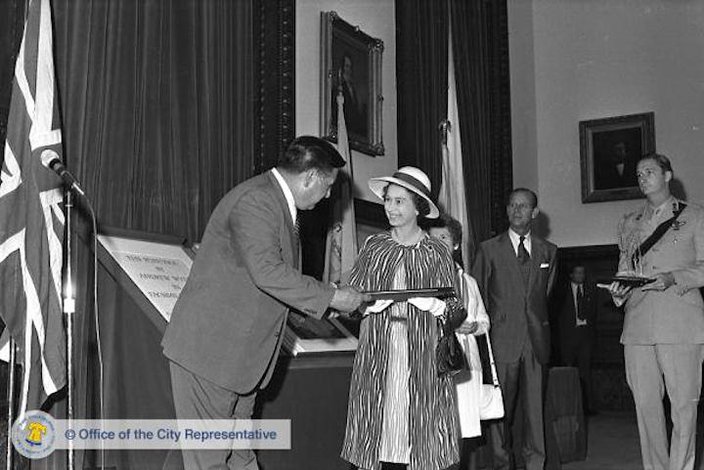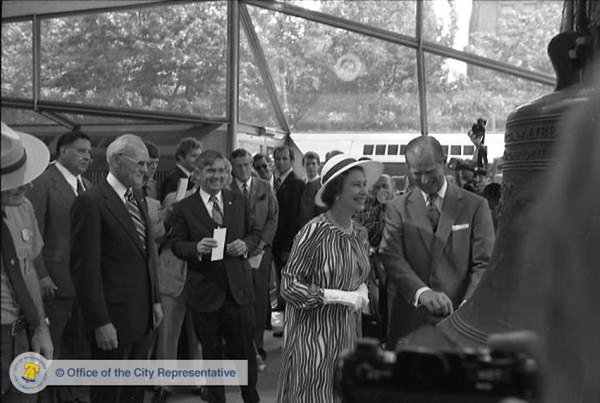Queen Elizabeth II, who died at age 96 on Thursday, once visited Philadelphia to deliver a symbolic gift to the United States during the county's bicentennial celebration in 1976.
During a July 6, 1976, appearance at Independence National Historical Park, the queen presented the Bicentennial Bell, which was cast at the same London foundry where the Liberty Bell had been made prior to the American Revolution.
- MORE NEWS
- Delco man sentenced to 9 months in prison for role in Jan. 6 Capitol riot
- Erie County woman killed in shark attack while vacationing in Bahamas
- For Raheem Manning, the nighttime is the right time for Philadelphia
The approximately 6-ton bell – 6 feet, 10 inches in diameter at its lip and 5 feet, 6 inches in height – has an inscription that reads, "For the People of the United States of America from the People of Great Britain, 4 July 1976, Let Freedom Ring."
"It is a message in which both our people can join and which I hope will be heard around the world for centuries to come," the queen said, adding that she was grateful to America's Founding Fathers for teaching the British "to respect the right of others to govern themselves in their own way."

The Bicentennial Bell was placed in a tower outside the park's original visitor center, where it remained until its removal in 2013 to make way for the Museum of the American Revolution. The bell has been in storage ever since. But there are plans to showcase it in a revamped garden at Third and Walnut streets.
Elizabeth, who was the longest reigning monarch in Britain, died surrounded by the royal family at Balmoral Castle in Scotland. She had been under medical supervision and was resting at the advice of her doctors. The queen had survived a bout with COVID-19 earlier this year and suffered from other health problems, including mobility issues that increasingly had limited her involvement in affairs at Buckingham Palace.
The queen's death marks a profound generational shift in the British royal family. Elizabeth had been the reigning monarch since her father's passing in 1952, when she was 25. Her death comes after her husband, Prince Philip, Duke of Edinburgh, died last year.
The next in line to succeed Elizabeth II is her eldest son, Prince Charles, who will inherit the sovereign title and become head of the Commonwealth, in addition to inheriting land and other assets. He issued a statement on his mother's death Tuesday afternoon.
A London native, Elizabeth rose to the royal family throne during a period of transition and progress following World War II. She came to be venerated around the world as the leader of a symbolic power structure whose importance lies in tradition and the stewardship of social values. Once thought of as a fairytale queen, Elizabeth helped usher the monarchy into modernity during her 70-year reign, embracing reforms and adapting to the public scrutiny that envelops royal life.
In February 2020, as the world was entering the COVID-19 pandemic, the Independence Historical Trust and Independence National Historical Park announced progress on a plan to create a Bicentennial Bell Garden in Old City to house the bell from Elizabeth.
The plan is to rehabilitate the existing garden, known as the Benjamin Rush Garden or Boxwood Garden, and build a historical attraction that commemorates the relationship between the U.S. and Britain. Once fierce adversaries, the two nations grew to become historical partners and allies.
The project received $1 million in support from the Landenberg Family Foundation, with a goal to complete the garden in time for the nation's 250th birthday celebration in Philadelphia in 2026.
The bell's planned return to public view will serve as a marker of the queen's efforts to forge a deeper bond between the two nations. During her address in Philadelphia in 1976, she remarked that Britain should view the Fourth of July as a day of celebration for what emerged from the Revolutionary War.
"Ultimately peace brought a renewal of friendship which has continued and grown over the years and has played a vital part in world affairs," Elizabeth said. "Together we have fought in two world wars in the defense of our common heritage of freedom. Together we have striven to keep the peace so dearly won. Together, as friends and allies, we can face the uncertainties of the future, and this is something for which we in Britain can also celebrate the Fourth of July."

